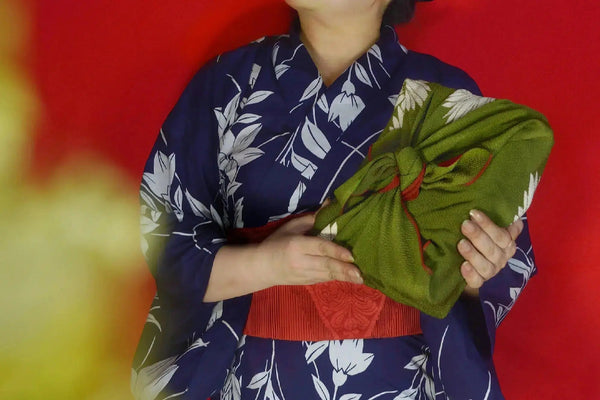
Jump to:
So let’s say you’re going over to a friend's house for dinner, and you’re bringing a nice bottle of red to go with that feast you know they’ve been working hard to prepare.
Now, you could just hand over that wine in a brown paper bag, but you’re too civilized for that. Why settle for ordinary? Instead, you present a beautifully wrapped package. As your friend unfolds the wrapping, they realize it's not just packaging – it's a gorgeous, reusable cloth that's as much a gift as what's inside.
“What is this?” They ask with excited curiosity.
“Furoshiki!” You exclaim, telling them all about this cool thing that you learned about on your travels to Japan.
Furoshiki is a Japanese wrapping cloth that is (like so much of Japanese culture & its unique elements) both practical and sophisticatedly stunning.
Furoshiki has been part of Japanese culture for centuries, but it's now catching on globally as people look for eco-friendly alternatives to plastic packaging and disposable gift wrap. These versatile fabric creations aren't just for presents, either. Furoshiki can be fashioned into bags, used to carry groceries or even worn as scarves.
Want to discover why this longstanding Japanese practice is more relevant than ever? Read on, soon-to-be furoshiki fans!
What Is Furoshiki? What Does Furoshiki Mean In Japanese?

Furoshiki (風呂敷) is a type of traditional Japanese wrapping cloth used to transport clothes, gifts or other goods.
The word "furoshiki" literally translates to "bath spread." This name comes from its original use in the Edo period, when people would wrap their clothes in these types of cloth while at public bathhouses.
Today, furoshiki has evolved beyond its Japanese bathhouse origins. It's now a catch-all term in modern Japan for a square piece of fabric used for wrapping and carrying items. Think of furoshiki as the original reusable bag, but with a lot more style and versatility.
Quick Language Lesson from Japanese Taste: Furoshiki Pronunciation
Curious how to pronounce furoshiki?
“foo-roash-kee”
Though technically it has four hiragana “letters” and therefore four syllables in theory, “furoshiki” comes out sounding more like a three-syllable word in a lot of the Japanese dialects that you’d hear while visiting Japan.
If you’re a fan of piroshki (the Eastern European pastry that’s quite popular in areas of Japan too), the pronunciation between piroshki and furoshiki isn’t dissimilar.
How Furoshiki Stands Out: Versatility & Beauty Combined, Very Japanese!

What sets furoshiki apart from other wrapping methods is its flexibility.
The same cloth can be used to wrap items of various shapes and sizes, from books, bottles and bento boxes to melons and flower arrangements. Furoshiki is all about the folding technique, which we'll get into later.
But furoshiki is more than just practical. It’s a veritable art form.
Many furoshiki cloths feature beautiful designs, ranging from traditional Japanese motifs to modern patterns. When used to wrap a gift, the furoshiki becomes part of the present itself, adding an extra layer of thoughtfulness and displaying intent to the act of giving.
In essence, furoshiki embodies many aspects of Japanese culture. Resourcefulness, attention to detail and an appreciation for beauty in everyday objects are all featured in furoshiki.
As more people around the world discover furoshiki, we see the spread of the Japanese mindset that values sustainability and elegance in equal measure. Versatility and beauty, if you will.
How Is Furoshiki Used?

Furoshiki is incredibly versatile.
At its core, it's a simple square of fabric. But in skilled hands, furoshiki transforms into a variety of useful shapes.
Here are some common uses:
Gift Wrapping: Furoshiki’s Most Popular Application
This is probably the most well-known use. A furoshiki can beautifully wrap anything from books to bottles, adding a personal touch to your presents. Your friend, family member or lucky colleague is really getting two gifts in one, thanks to this form of Japanese gift wrapping that they’re sure to love!
Shopping Bags: Goodbye Plastic, Hello Furoshiki!
Fold a furoshiki into a quick tote bag for groceries or other items. It's sturdy, reusable, environmentally friendly & sustainable – and much prettier than plastic!
Picnic Bundle: Beauty & Form on the Go
Wrap your bento box and utensils in a furoshiki for an eco-friendly picnic setup. Again, a big improvement over plastic. And thanks to furoshiki cloth wrapping, you get to carry that beauty with you (and bring it back home to use again & again).
Home Decor: What’s That on the Wall? Furoshiki!
Larger furoshiki make great table runners or wall hangings, adding a pop of color and pattern to your space. Your guests are sure to be impressed.
Travel Organizer: Bringing Furoshiki on Your Adventures
Use smaller furoshiki to separate and organize items in your suitcase. Then use it for shopping or picnics while on your travels (hopefully to Japan!).
The beauty of furoshiki lies in its adaptability. With a bit of practice, you can create different shapes and styles to suit your needs.
History Of Furoshiki: More Than A Millennium Of Practicality, Versatility And Beauty

Furoshiki has been around for over 1,200 years, with its roots tracing back to the Nara period (710-784 AD).
Initially, it was used to wrap and protect valuable goods in transit.
During the Edo period (1603-1867), public baths became popular, and people started using furoshiki to wrap their clothes while bathing. This is where the name "furoshiki" (bath spread) comes from.
As Japan modernized in the 20th century, furoshiki fell out of everyday use. However, in recent years, there's been a revival of interest in this traditional practice, both in Japan and internationally.
This resurgence is partly due to growing environmental awareness and a desire for sustainable alternatives to single-use packaging. Furoshiki fits the bill, for sure!
Materials, Sizes & Patterns Of Furoshiki
Traditionally, furoshiki were made from silk. Today, however, you'll find this popular Japanese gift wrapping cloth in a variety of materials:
Cotton: Durable and easy to care for, cotton furoshiki are perfect for everyday use.
Silk: Luxurious and often used for formal occasions, silk furoshiki are a real winner.
Rayon: Offers a silky furoshiki feel at a lower price point; the best of both worlds.
Nylon: Water-resistant, great for wrapping damp items (super handy in Japan’s rainy season!).
Furoshiki wrapping cloth sizes typically range from about 45 cm (18 inches) square for wrapping small items, up to 2 meters (6.5 feet) square for larger bundles. The most common size is around 70 cm (28 inches) square, which is versatile enough for most uses.
As for patterns of furoshiki, the sky's the limit.
Old school furoshiki designs often feature nature motifs like cherry blossoms, cranes or waves. You'll also find geometric patterns, solid colors and modern designs. Some furoshiki even depict famous ukiyo-e prints or contemporary artwork.
How To Wrap Furoshiki

Wrapping with furoshiki is an art form in itself. When done properly, furoshiki wrapping will wow the recipient of the gift, not just in what you chose for them but the fabric and the way in which you wrapped it.
Here are the basics for a simple furoshiki Japanese wrap:
- Lay your furoshiki flat, pattern-side down
- Place your item diagonally in the center
- Fold the opposite corners over the item
- Tie the remaining corners in a knot above the item
This basic technique works for many objects, but there are dozens of other folding methods for specific items. For example, wrapping a wine or sake bottle involves a different technique than wrapping a book or a Japanese bento box.
The key is to experiment and have fun with it!
Part of the charm of furoshiki is that each wrap can be unique, reflecting the personality of both the giver and the item being wrapped.
What To Wrap In Furoshiki
Furoshiki can wrap just about anything, but here are some popular items:
Gift Wrapping: Furoshiki Favorite
Books, clothing, toys, you name it. The better question is, what doesn’t go well in a furoshiki gift wrapping cloth?
Food: Furoshiki for Picnics, Bento & More
Bento boxes, picnic items or homemade treats for friends – all of these are great uses for furoshiki. So is wrapping melons and other delicate fruits.
Bottles: Wine, sake or other beverages.
Personal items: Use as a purse or to organize items in your bag.
Remember, the wrapping is part of the gift, so choose a furoshiki that complements the item inside and suits the recipient's taste.
Where To Buy Furoshiki

In Japan, you can find furoshiki in various places, such as markets or specialty stores, as well as department stores.
But you don’t have to travel all the way to Japan (though who wouldn’t want to?!) just for furoshiki. Did you know that we have great furoshiki right here at Japanese Taste?!
Maruwa Brand: What Makes This Furoshiki Special
One standout brand in the world of furoshiki is Maruwa.
This company has been crafting high-quality furoshiki for generations, meshing traditional Japanese cloth patterns and techniques with present-day preferences and uses.
What sets Maruwa apart is their commitment to authenticity & furoshiki quality. They use time-honored dyeing methods and premium fabrics to create furoshiki that are both beautiful and durable. Many of Mauwa’s furoshiki designs draw inspiration from classic Japanese art.
It’s a fabulous piece of Japan with every furoshiki wrap!
Furoshiki Is Japanese Form & Beauty All Wrapped Up In One!

Furoshiki is more than just a way to wrap things.
It's a sustainable practice, an art form, a way to show someone that you care.
Furoshiki offers a simple yet profound way to reduce waste, add a special touch to your gift-giving and simply bring more beauty into your daily life
Make your next wrapped gift a conversation starter and a treasured keepsake in its own right!


0 comments